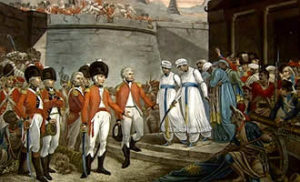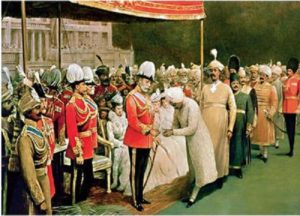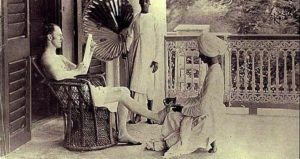By Marria Qibtia Sikandar Nagra
 Histories are strange. Pregnant with the grandeur of the past, they narrate stories , whose metaphorical derivations seep right into the present. For some nations, they may project a glorious past while for other ones , they dictate an extrication from the clutches of oppression, signalling a path towards gloriousness itself. Analysed in this context , the European colonisation of South Asian countries neither falls in the latter nor the former category. In fact it stands as a historical phase, that not only deprived the locals of their rightful autonomous posturing , but also propelled a further degeneration of the cultural and social values of the people of this region.
Histories are strange. Pregnant with the grandeur of the past, they narrate stories , whose metaphorical derivations seep right into the present. For some nations, they may project a glorious past while for other ones , they dictate an extrication from the clutches of oppression, signalling a path towards gloriousness itself. Analysed in this context , the European colonisation of South Asian countries neither falls in the latter nor the former category. In fact it stands as a historical phase, that not only deprived the locals of their rightful autonomous posturing , but also propelled a further degeneration of the cultural and social values of the people of this region.
 During the European colonisation of the Indian subcontinent, the asymmetricity of the society was a cogent truth. While the English men were prefixed with the ‘babus,’ ‘sahibs’ and ‘sirs’, the locals internalised in themselves an inferiority of their origin, their mind-scales, their culture as well as their complexions. When E.M Foster talks about “Englishmen posing as Gods”, this aspect of colonialism is what he is really alluding to. When the colonial phase ended, and the British left for England, they also left behind a degenerated, and a self-conscious population that was made to believe in its lowliness and subordination. They might have left the region on physical grounds, but the metaphorical imprints of their influence continue to rule over South Asian mindsets till date. Their lust for power concealed under the veneer of viable ‘economic opportunities’ in South Asia, did more wrong than meets the eye. When they came over, influenced the locals through power tactics, they also made them see how they were not worthy of the positions that their British masters enjoyed.
During the European colonisation of the Indian subcontinent, the asymmetricity of the society was a cogent truth. While the English men were prefixed with the ‘babus,’ ‘sahibs’ and ‘sirs’, the locals internalised in themselves an inferiority of their origin, their mind-scales, their culture as well as their complexions. When E.M Foster talks about “Englishmen posing as Gods”, this aspect of colonialism is what he is really alluding to. When the colonial phase ended, and the British left for England, they also left behind a degenerated, and a self-conscious population that was made to believe in its lowliness and subordination. They might have left the region on physical grounds, but the metaphorical imprints of their influence continue to rule over South Asian mindsets till date. Their lust for power concealed under the veneer of viable ‘economic opportunities’ in South Asia, did more wrong than meets the eye. When they came over, influenced the locals through power tactics, they also made them see how they were not worthy of the positions that their British masters enjoyed.
 This bred an asymmetrical society, that ran on the grounds of mastery and subservience. Where the rich, the influential had to be bowed down and respected, while a person belonging to the economic or social lower rung of the society, was considered unworthy of approval as well as presence. This dynamic of asymmetricality is something that persists till date. In South Asian countries like Pakistan, India, or Bangladesh the concept of ‘sahibs’ and masters continue to exist. The society is divided in a manner that the people belonging to lower social classes find it hard and at times almost impossible to make their demands and their concerns heard. The fact that their issues do not directly hamper the elitist social and political life of the ‘sahibs’, makes their voices unheard. It is a celebratory occasion when someone from a humble social class manages to climb the ladder by virtue of his hard work and perseverance.
This bred an asymmetrical society, that ran on the grounds of mastery and subservience. Where the rich, the influential had to be bowed down and respected, while a person belonging to the economic or social lower rung of the society, was considered unworthy of approval as well as presence. This dynamic of asymmetricality is something that persists till date. In South Asian countries like Pakistan, India, or Bangladesh the concept of ‘sahibs’ and masters continue to exist. The society is divided in a manner that the people belonging to lower social classes find it hard and at times almost impossible to make their demands and their concerns heard. The fact that their issues do not directly hamper the elitist social and political life of the ‘sahibs’, makes their voices unheard. It is a celebratory occasion when someone from a humble social class manages to climb the ladder by virtue of his hard work and perseverance.
 Another area of colonial influence on South Asian mindsets is manifested in the South Asians obsession with whiter complexions. Since long made to believe that their wheatish complexions lack aesthetic appeal and do not meet contemporary beauty standards, the South Asians yearning for a fairer skin is understandable. It is not only rooted in the idea that a fair complexion will make them beautiful, and hence stand out but also derives from the belief that fairer complexion people are much more successful in their life! For instance a typical South Asian girl would go at lengths to get her complexion altered to a fairer tone simply to secure better marriage proposals. Psychologically seen, this obsession with fairer skin tones is best understood in the projection of South Asian insecurities onto whiter complexions. They simply believe that being white, like the colonials will make them worthy of honour and respect.
Another area of colonial influence on South Asian mindsets is manifested in the South Asians obsession with whiter complexions. Since long made to believe that their wheatish complexions lack aesthetic appeal and do not meet contemporary beauty standards, the South Asians yearning for a fairer skin is understandable. It is not only rooted in the idea that a fair complexion will make them beautiful, and hence stand out but also derives from the belief that fairer complexion people are much more successful in their life! For instance a typical South Asian girl would go at lengths to get her complexion altered to a fairer tone simply to secure better marriage proposals. Psychologically seen, this obsession with fairer skin tones is best understood in the projection of South Asian insecurities onto whiter complexions. They simply believe that being white, like the colonials will make them worthy of honour and respect.
 Similarly, the colonial influence on South Asians also manifests itself in the form of the disregard of their local languages in the favour of English. This English prioritisation is a result of their belief that it will not only grant them better social and professional opportunities but will also make them appeal to a wider social circle.The association of the notion of respect and dignity with a solid comprehension and learning of the English language signifies a strong sense of cultural inadequacy and poverty. Ashamed to boast their local languages and cultural values, this prioritisation of English speaks volumes about their hybrid mindsets. Of course there is nothing wrong in seeking to learn a new language and in this case English. But when such a learning derives from a space of personal inadequacy , and comes at the cost of the value you impart to your personal cultural languages, it is a matter worth serious consideration.
Similarly, the colonial influence on South Asians also manifests itself in the form of the disregard of their local languages in the favour of English. This English prioritisation is a result of their belief that it will not only grant them better social and professional opportunities but will also make them appeal to a wider social circle.The association of the notion of respect and dignity with a solid comprehension and learning of the English language signifies a strong sense of cultural inadequacy and poverty. Ashamed to boast their local languages and cultural values, this prioritisation of English speaks volumes about their hybrid mindsets. Of course there is nothing wrong in seeking to learn a new language and in this case English. But when such a learning derives from a space of personal inadequacy , and comes at the cost of the value you impart to your personal cultural languages, it is a matter worth serious consideration.
 When the British ended their colonial endeavours in South Asia, it signalled a momentous chapter in South Asian history. It was believed to pave path for the progress and development of the locals in accordance with their cultural and social norms and values. However, when slavish attitudes are internalised , when the white appeal supersedes rational decision making positions, it really does not matter where and when the colonials came to display influence. What really matters then is how the locals responded to the aggression. In our case, we failed to resuscitate our values long after the colonial powers left. This aspect is what we really need to think about.
When the British ended their colonial endeavours in South Asia, it signalled a momentous chapter in South Asian history. It was believed to pave path for the progress and development of the locals in accordance with their cultural and social norms and values. However, when slavish attitudes are internalised , when the white appeal supersedes rational decision making positions, it really does not matter where and when the colonials came to display influence. What really matters then is how the locals responded to the aggression. In our case, we failed to resuscitate our values long after the colonial powers left. This aspect is what we really need to think about.









